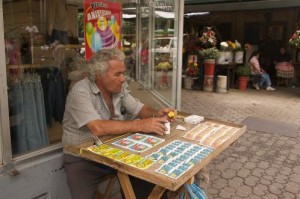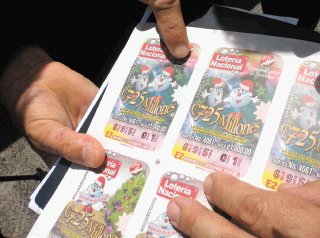There is something quite fascinating about the Tico obsession with the National Lottery. Each week thousands of colorful lottery tickets are sold on the streets in towns and villages across the country and the results eagerly awaited live on Sunday evening TV.
 The concept of a lottery goes back a long way. Earliest documented references to keno slips in China date from two hundred BC when the funds raised were thought to support major projects like the building of the Great Wall of China. Later the Roman Emperor, August Caesar, used a lottery to generate money from repairs to the city of Rome. In Costa Rica, the Junta de Proteccción Social sponsors schemes that help the disabled and the poor, a worthy cause, which gives the feel good factor that you are making an act of charity when you buy a lottery ticket.
The concept of a lottery goes back a long way. Earliest documented references to keno slips in China date from two hundred BC when the funds raised were thought to support major projects like the building of the Great Wall of China. Later the Roman Emperor, August Caesar, used a lottery to generate money from repairs to the city of Rome. In Costa Rica, the Junta de Proteccción Social sponsors schemes that help the disabled and the poor, a worthy cause, which gives the feel good factor that you are making an act of charity when you buy a lottery ticket.
The Costa Rican lottery is a little tricky to understand. Each ticket contains two sequences, that is, a series and a number. The series has three digits from 000-999 and the number of the ticket is from 0-99, which means 100,000 numbers are available each week. To make it more complicated ten identical tickets are printed with the same series and number – these are termed fracciónes. If you buy all ten fracciónes and win the first prize, then you win the lot, otherwise you share the money with the other fraction holders. With ten editions of each number, in theory if all the tickets were sold, you would have a 1 in a million chance of winning the jackpot from each ticket. Clearly, not all the tickets are sold, so your chances are even better.
The drawing of the winning numbers takes place at 7pm on local TV channels. The numbers are painted on white ping pong balls which are tumbled in a rotating wire sphere and then removed by hand. A second sphere of balls contains the prizes, which also come out randomly. The master of ceremonies is precise and measured in his hand movements as if performing a sacred duty before his congregation. His assistant verifies the selection, displays the offering before the cameras and shows that everything is open, honest and dependable. The whole graceful act takes place on a smart wooden desk in what appears to be someone’s municipal office. Apparently, years ago there was a public outcry when it was proposed to modernize the process, so the low tech and quaint system remains.
You will never become super rich from the Lotería Nacional, but the allocation of prizes is generous, and so too is the income raised. Like all lotteries, this form of national revenue is questionable. It is a form of painless taxation the government uses to raise funds for social welfare programmes. The people who generally buy lottery tickets are those who can least afford to throw away money. There is no doubt those who benefit from the welfare programmes are grateful, but one could argue it is disingenuous of the Government to exploit people’s hopes through their pockets. The street vendors sell more than lottery tickets- they are selling hopes and dreams to the citizens of Costa Rica.
By Stewart Hird

